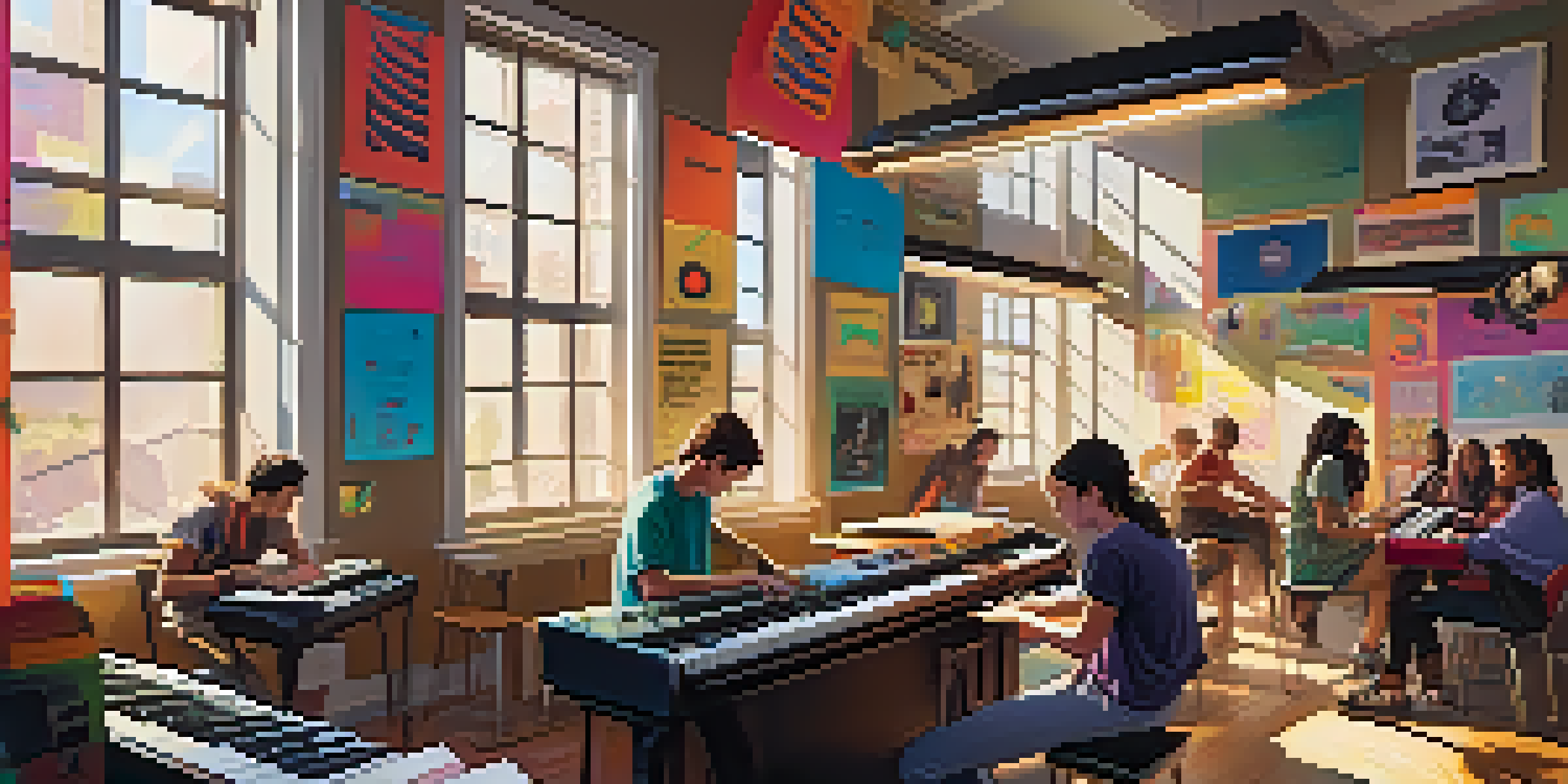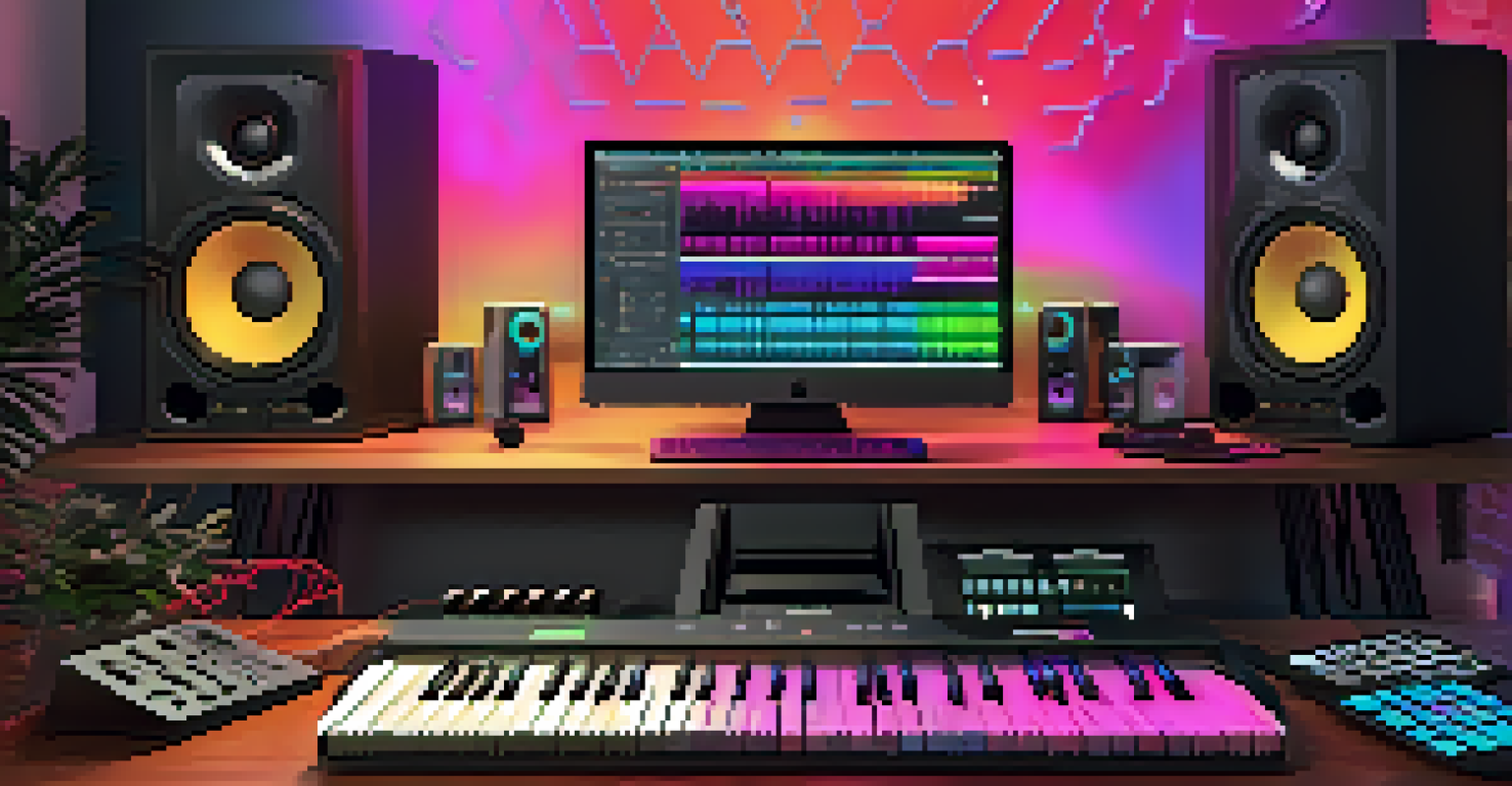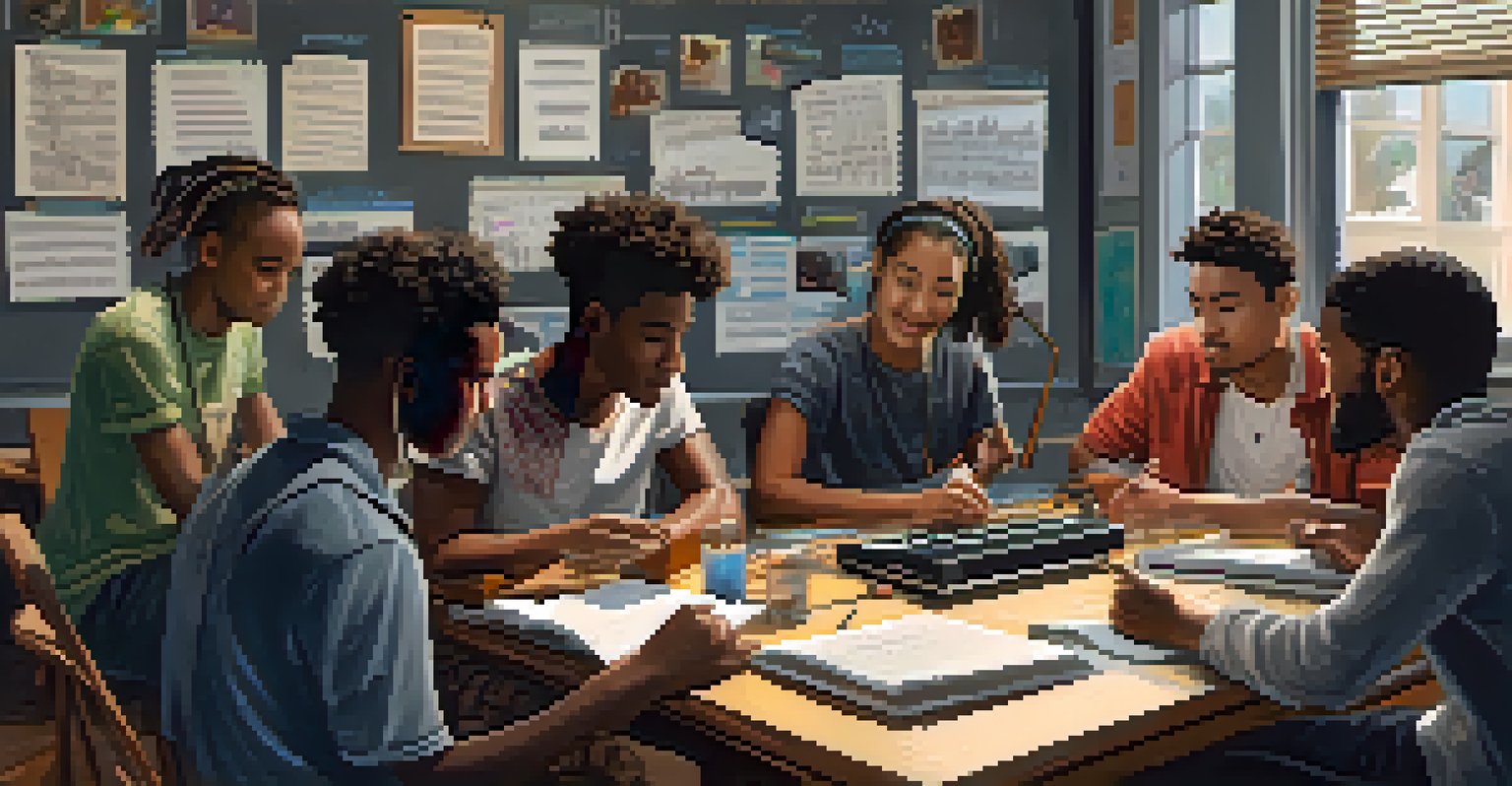Music Production Techniques for Modern Classroom Settings

The Importance of Music Production in Education
Music production is not just about creating songs; it fosters creativity and collaboration among students. In modern classrooms, integrating music production can enhance learning experiences by encouraging teamwork and problem-solving skills. Students learn to express themselves through sound, which can boost their confidence and engagement in other subjects as well.
Music can change the world because it can change people.
Moreover, music production teaches essential technical skills that are increasingly relevant in today’s digital world. By using software and hardware tools, students become familiar with audio editing, mixing, and sound design, skills that are valuable in various careers. This hands-on experience can spark interest in fields such as audio engineering, film scoring, or even game design.
Finally, incorporating music production into the curriculum helps bridge the gap between traditional learning and modern technology. As students navigate through software and creative processes, they gain digital literacy and critical thinking skills that are crucial in the 21st century. Ultimately, this approach transforms the classroom into a dynamic learning environment.
Essential Tools for Classroom Music Production
To get started with music production in the classroom, having the right tools is crucial. Digital Audio Workstations (DAWs) like GarageBand, FL Studio, or Ableton Live provide user-friendly interfaces that are perfect for beginners. These platforms allow students to experiment with sounds, record their voices, and create full compositions, all while having fun.

In addition to software, hardware tools such as MIDI keyboards and audio interfaces can enhance the production experience. A MIDI keyboard allows students to play and arrange melodies easily, while an audio interface ensures high-quality sound input and output. Together, these tools create a professional environment where students can produce polished tracks.
Celebrating Student Success
Showcasing student music projects boosts confidence and pride, creating lasting memories and a love for music production.
Finally, don't underestimate the power of mobile apps for music production. Applications like BandLab or Soundtrap enable students to create music on the go, making it even easier to explore their creativity outside of the classroom. With a mix of software, hardware, and mobile solutions, students can have a comprehensive music production experience.
Incorporating Music Theory into Production
Understanding music theory can greatly enhance a student's ability to produce music effectively. Concepts such as scales, chords, and rhythm are foundational elements that can be integrated into the production process. Teaching students these concepts alongside practical production techniques helps them create more structured and compelling music.
The beautiful thing about learning is that no one can take it away from you.
For instance, students can learn to identify chord progressions while experimenting with different sounds in their DAW. This application of theory makes learning more engaging as they see how these concepts come to life in their own creations. It not only solidifies their understanding but also allows for deeper musical expression.
Additionally, incorporating music theory into production can help students analyze their favorite songs. By breaking down the elements of popular tracks, they can gain insights into the composition process, which can inspire their own work. This analytical approach fosters a greater appreciation for music and enhances their production skills.
Collaboration and Peer Feedback in Music Projects
Collaboration is a key aspect of music production that mirrors the real-world music industry. Encouraging students to work together on projects fosters a sense of community and teamwork. They learn to share ideas, critique each other's work, and ultimately create a piece that reflects the collective vision of the group.
Implementing peer feedback sessions can significantly improve the quality of student projects. By providing constructive criticism, students learn to appreciate different perspectives, which can lead to innovative ideas. This process also builds their communication skills, as they must articulate their thoughts effectively.
Enhancing Creativity Through Music
Integrating music production in education fosters creativity, collaboration, and problem-solving skills among students.
Furthermore, collaboration can inspire creativity and motivation. When students see their peers engaged in the creative process, it can ignite their enthusiasm and drive to contribute. This sense of belonging and shared purpose can elevate their overall learning experience in music production.
Utilizing Technology for Remote Music Production
In today's digital age, technology plays a vital role in facilitating remote music production. With the rise of online collaboration tools, students can work together regardless of location. Platforms like Zoom or Google Meet allow for real-time discussions, while cloud-based DAWs enable students to share and edit projects seamlessly.
Additionally, utilizing online resources such as tutorials and forums can enhance the learning experience. Students can access a wealth of information on music production techniques, software tips, and industry insights. This self-directed learning empowers them to explore their interests and grow as producers.
Moreover, remote production encourages students to take ownership of their learning. They can experiment with different techniques and styles at their own pace, which can lead to more personalized and meaningful projects. In a world where remote work is becoming the norm, these skills are invaluable.
Incorporating Genres and Diverse Music Styles
Exploring various music genres in the classroom can greatly enrich students' production experience. By introducing styles like hip-hop, jazz, or electronic music, educators can help students discover their musical preferences and creativity. This exposure encourages them to experiment with different sounds and techniques, broadening their artistic horizons.
Furthermore, studying diverse music styles fosters cultural appreciation and awareness. Students learn about the history and significance of different genres, which can deepen their connection to music and its impact on society. This understanding can inspire them to incorporate unique elements from various styles into their own productions.
Essential Tools for Production
Utilizing Digital Audio Workstations and hardware like MIDI keyboards enhances the music production experience in the classroom.
Additionally, inviting guest artists or local musicians to share their experiences can provide students with real-world insights. They can learn about the challenges and triumphs of working in the music industry, which can motivate them to pursue their passions. Ultimately, this exploration of genres creates a vibrant and inclusive classroom environment.
Showcasing Student Productions and Celebrating Success
Once students have completed their music projects, it's important to celebrate their hard work. Organizing a showcase event allows them to present their creations to peers, teachers, and even family members. This not only boosts their confidence but also fosters a sense of pride in their accomplishments.
Moreover, sharing student productions through online platforms can reach a wider audience. Posting their work on social media or school websites allows for recognition and feedback from the broader community. This exposure can be incredibly motivating and can inspire other students to get involved in music production.

Lastly, celebrating success in music production can create lasting memories. Whether through performances, recordings, or digital exhibitions, these experiences become milestones in a student's educational journey. By valuing their creativity, educators can instill a lifelong love for music and production.